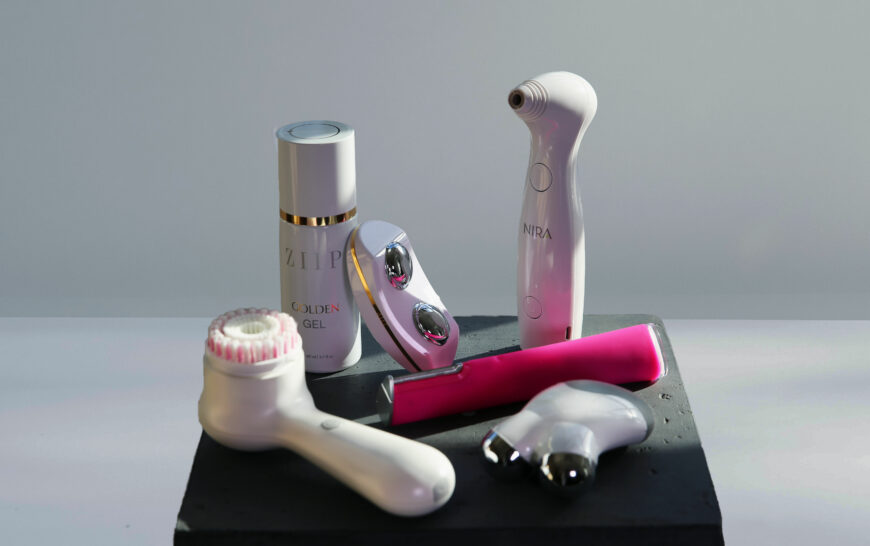
This is a guest post written Emjoy, the female-founded audio app helping over 400,000 women to prioritise their sexual well-being. Illustrations by Beatrise Birina.
Do you feel queasy when you hear the term ‘self-pleasure’? Maybe you agree that masturbation is fine, or at least not bad… for other people. But for yourself, you can’t fight the feeling that touching yourself is embarrassing, dirty even. The thing is… none of that’s true. We all deserve sexual pleasure, no matter our relationship status. So why do we get this ick feeling in the first place? And how can we get over it and fully embrace our bodies and sexuality? Read on to find out.
Why we get the ‘ick’ feeling
You’re not alone if self-pleasure makes you feel guilty, ashamed or embarrassed. Some of us have been brought up by families who’ve taught us, directly or indirectly, that masturbation is shameful or simply not allowed. Many of us have also grown up in religions, cultures or societies which shame us for wanting to discover our bodies and explore our sexuality.
Even the few of us who grew up in sex-positive households and received excellent sex education haven’t escaped sexual shame. Body-shaming and negative messages about our sexuality and right to pleasure are everywhere: TV, the music we listen to, advertising and more.
Emjoy
These messages of shame are so pervasive that we can feel guilt, disgust and self-loathing just thinking about our sexual desires and fantasies.
Women are shamed more than men
Sexual shame is particularly weaponised against women. Just think of all the times female victims of sexual assualt are asked what they were wearing when the crime took place. Or of how many successful women are accused of and judged for using their body and sexuality to progress in their careers. These are just a few examples, but you can see how women end up internalising the idea that their bodies are sexual objects, which they can be shamed for. No wonder so many of us feel the need to strictly monitor and control our bodies and sexuality, to avoid being labelled “sluts” or “whores” who are “begging for it”.
So while it’s more or less accepted that men masturbate, and even celebrated as a sign of masculinity, a woman who admits to doing the same could be considered “sex-obsessed” or “dirty”. Evidently, mainstream society believes there’s something abnormal or even dangerous about a woman taking her pleasure, quite literally, into her own hands.

Why shame is pleasure’s enemy
If you’re feeling sexual shame about what you do with your body or even just what your fantasising about, are you going to feel relaxed and receptive to pleasure? No way. It’s going to send your orgasms running for the hills. Pleasure is about delight, enjoyment, relaxation and surrender. But if shame joins the party, all those good vibes will be dampened by guilty thoughts of “I shouldn’t be doing this”, “This is wrong”, “Am I dirty?”.
But we deserve to enjoy our bodies and sexuality and reap all the rewards of masturbation, of which there are many.
The benefits of masturbation
Now that we’ve seen why we can feel icky when it comes to self-pleasure, we’re in a better position to start overcoming that feeling. But first, here’s a quick reminder of why it’s important to make time for self-pleasure in the first place.

Self-knowledge
Let’s start with one of the fundamentals – self-knowledge. Exploring your own body and finding out where you like to be touched is incredibly empowering and helps you to discover your likes, dislikes and new sources of pleasure. And unlike partnered sex, you’re in no rush and under absolutely no pressure to act or look a certain way in the process.
More orgasms
Solo-play and the resulting self-knowledge is also the key to more orgasms. Sometimes partnered sex can be accompanied by performance anxiety, worries about body image, and other insecurities. But solo sex is free of these obstacles to orgasm. It’s uncomplicated. And when you’re relaxed, you’re more likely to have an orgasm. In fact, one study found that women who masturbated experienced more orgasms than women who only had partnered sex. Considering the giant, gaping orgasm gap between men and women, this isn’t surprising. And it also gives hope to women who’ve never had an orgasm before and want to.
Stronger relationships
Not only does the self-knowledge from masturbation help you enjoy more pleasure in solo-sex, it can also improve partnered sex and strengthen your relationship. After all, we can’t expect our partners to be mind readers, and while some things have to be learnt through trial and error, most people appreciate getting a few pointers on how to make the sex A-M-A-Z-I-N-G. Not only will it make them feel like a rockstar in bed, your sex will be better, making you want to do it more often.
Higher Sex Drive, Improved Sleep and More
Your libido, just like your home, car, and body, needs regular TLC to keep it in good shape, and masturbation is a powerful libido booster. That’s because every time you orgasm, your body releases testosterone, the hormone responsible for your sex drive. One 2011 study actually found that even just having sexual fantasies releases testosterone. So whether you’re masturbating or arousing your mind with a sexy story (even without orgasming) you’ll be pleased to know you’re keeping your libido in good health.
What’s more, masturbation has been proven to improve sleep, relieve menstrual cramps, reduce stress, improve your mood, and much more. As you can see, masturbation is a powerful tool for boosting your overall well being. So don’t let shame get in the way of all those yummy benefits. And by the way, if you discover that you don’t like masturbating, you should know that’s also okay. It’s up to you to decide how and when your body is touched. So with all that in mind, let’s learn how to combat the self-ick of self-pleasure and start to fully enjoy our bodies and sexuality.
Identify your sources of shame
The first step to overcoming the self-ick of self-pleasure is to understand where your sexual shame originates. Get started by answering the questions below. You can answer in your head if you like, but a lot of people find it helpful to write their answers down. Try to be honest with yourself and be as specific as possible.
- What are your earliest memories related to sex?
- What messages did you receive about your and other people’s bodies and sexual behaviour?
- What did your parents teach you about sexuality?
- If your family never talked about sex, what lesson did that teach you?
- What messages did you receive from teachers, past lovers, and friends?
- What lessons did you learn from films, books, music, and political or religious beliefs?
Once you’ve identified the type of messages you’ve received and where your sexual shame comes from, you have a choice: Will you continue believing these messages of shame, or can you let them go?
Of course, just because you identify where your shame comes from, it doesn’t mean it will go away overnight. Messages of shame are everywhere. So resolve to be vigilant about noticing messages when they come up and make this a lifelong practice. You always have the choice to listen to them or not.

Get rid of ‘should’ and ‘shouldn’t’
Messages of shame create ideas of what we “should” and “shouldn’t” do. So here’s a life hack: pay less attention to “should” and “shouldn’t”. These words are usually accompanied with pressure to comply with other people’s expectations.
Acknowledge your true desires, identify what you like and dislike, set boundaries, ask for what you want, and express yourself authentically.Emjoy
Listening to these two words can make it difficult to acknowledge your true desires, identify what you like and dislike, set boundaries, ask for what you want, and express yourself authentically. It can even cause feelings of self-loathing when your desires don’t match up with your shoulds and should nots – a major roadblock to self-pleasure. But the truth is, there’s no one way you “should” or “shouldn’t” feel, look, desire or express your sexuality. So instead of asking yourself what you should or shouldn’t do, ask yourself what you want to do and make room for more fun and enjoyment.
Enjoy daily pleasures
There are tonnes of ways you can add more pleasure to your daily life and they don’t have to be related to sex. Maybe you could treat yourself to a food you really like, dedicate more time to a hobby you enjoy, take a sexy selfie, spend time putting together an outfit that makes you feel like a million dollars… The possibilities are endless.
So take a pen and paper, or your phone, and jot down at least one thing you could do every day of the week to add more pleasure to your life. This simple exercise is a great way to incorporate more enjoyment into your life and serves as a daily reminder that you deserve pleasure.
Re-educate yourself
Sexual shame often stems from misinformation. For example, as someone with a vagina, you may have been directly or indirectly taught that your value as a person is reduced once you’ve had vaginal sex. Or maybe you’ve been taught that masturbation is wrong and you’re a bad or dirty person if you do it. Fortunately, there are so many excellent resources out there to discover the truth and relearn false beliefs.
And you don’t have to go back to school to give yourself a reality-based and empowering sex education.You can create your own curriculum with sex-positive books, blogs, podcasts, and sexual-wellbeing apps like Emjoy, which has over 800 audio sessions created especially for women by sex experts. Check it out to get the sex-positive education you never had, discover loads of masturbation ideas, increase your libido with erotic stories, and much more.
Knowledge is power!

Make masturbation part of your self-care routine
Whether it’s working out, meditating, getting enough sleep or any other healthy habit, you know that it helps to make a schedule and stick to it. The same goes for self-pleasure. Remember all those benefits we talked about before: self-knowledge, more orgasms, stronger relationships, reduced stress… You can reap all those rewards and more by prioritising masturbation and making it part of your routine.
Schedule a sexy self-pleasure session some time when you won’t be disturbed and make a commitment to stick to it. Make it fun – light some candles, listen to an erotic story to get in the mood.Emjoy
And if you’re thinking that it’s not very sexy to schedule sex, we get where you’re coming from. But you know what’s less sexy than scheduling solo-sex? Not having it at all. You know how it is, you have the best intentions at first, but then you put it off and get busy with other things until you eventually forget about it altogether. So schedule a sexy self-pleasure session some time when you won’t be disturbed and make a commitment to stick to it. Make it fun – light some candles, listen to an erotic story to get in the mood, experiment with a sex toy… This time’s for you, so do whatever your heart desires. If this is something you’re not used to doing, it might feel a little weird at first, but it’ll feel more natural with time, and who knows… before long it might just become the highlight of your week.
Show yourself some compassion
Overcoming sexual shame is a lifelong task. There’s bound to be some ups and downs along the way, especially in the beginning. After all, it’s difficult to stop paying attention to shameful thoughts we’ve been thinking our entire lives. So when you find yourself feeling ashamed of your desires, fantasies or sexual activities, show yourself some compassion. If you find this difficult, imagine what you would tell a friend or a younger version of yourself. Would you try to shame them, tell them they were selfish or that they didn’t deserve self-pleasure? No. You’d reassure and encourage them. Show yourself that same compassion.
To get more support working through sexual shame, check out this wellbeing collection created by the Emjoy team.




